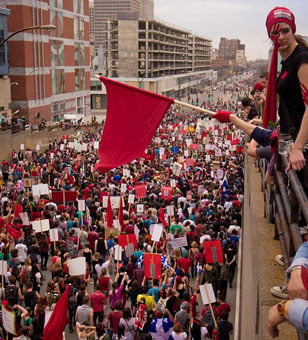The province of Québec is no stranger to large and powerful social movements (the 1949 Asbestos Strike comes to mind, as does the Summit of the Americas in Québec City, in 2001). However, the ongoing conflict between the provincial government and striking students and their supporters will go down in history as one of the province’s – indeed the country’s – biggest mass protests. On its 102nd day, the student movement is growing, as is the awareness of an ever more oppressive and corrupt government.
On May 22, nearly half a million people marched in the streets of Montreal in defiance of a recently adopted law denying protester’s civil liberties, namely the right to protest, freedom of association and of expression. A crowd made up of students, professors, children and citizens from every walk of life marched peacefully throughout the city, ignoring provisions prohibiting any deviation from the planned itinerary and disrupting the commercial and banking district. The crowd openly defied articles of Bill 78, which make any gathering of over 50 protesters illegal, and chanted for the resignation of Premier Jean Charest, who has systematically refused to meet with the students personally. Many consider that the government’s refusal to find a solution and, indeed, its increasingly repressive position have given the movement a second wind.
On Wednesday, May 23, more than 3,000 people assembled in Montreal, in Emilie-Gamelin Square for the 30th nightly protest, while throughout the city, citizens spontaneously took to the streets (in some neighborhoods, over 2,000 people) banging on pots and pans and blocking busy roads, in a situation reminiscent of the Argentinian protests of 2001. No longer just a student strike, the Maple Spring is fast becoming a widespread citizens’ revolt.
The Emilie Gamelin protest was declared illegal instants after it began, even though there had been no acts of violence from protesters. In fact, the one act of violence was directed at protesters, as a car whose driver decided to drive through the people barricading the street deliberately hit two young men.
Police tolerated the protesters until 1 AM, at which point they began to kettle the marchers within strategic parts of the city. Cavalry officers and baton-wielding municipal police had planned on striking forcefully and doubled their numbers. Most who were present insist that the march had been entirely peaceful, though the police contest this and claim that some projectiles were thrown at them (rocks, mostly). However, you will be hard-pressed to find any footage or pictures of these supposed acts taking place, although scores of journalists and cameras were present.
The police then proceeded to a mass arrest of 512 people and, though they gave the order to disperse, several protesters say that the police did not allow them to leave the kettle. The protesters then spent several hours in crowded city buses, denied water and access to toilets, waiting to be taken to a local detention center and identified. Most were levied a hefty fine ($612), though 12 were charged under the criminal code. In Québec City, 176 people were arrested for staging a sit-in.
Many people are calling these arrests outrageous and unjustified. Nightly protests in Montreal now resemble a war zone with flash bombs going off every few minutes and riot police chasing people down the streets.
The climate in the province is currently one of fear and anger. It is impossible to walk around Montreal in the evening without seeing hundreds of police cars, flanked by buses carrying hundreds of riot police, armed with high-pressure water guns and rubber bullets.
Some have commented that the streets of Montreal remind them of the images coming from Syria.
Recently, there have been rumors of military intervention. This would not be a first for the province, as the War Measures Act was invoked in 1970 during what came to be known as the “October Crisis.” Memories of this crisis still haunt the collective Québec consciousness and any mention of military intervention is met with expressions of angst. Ironically, Article 9 of the new law provides the minister of education with far-reaching powers to adapt (read suspend) any provincial law in order to break the strike.
However, the general mood of the protesters has not changed; they have become more determined and, with the movement growing larger as a result of Bill 78, further convinced they are closer to winning than ever. Indeed, nearly everyone now agrees that what started out as a refusal to accept an 82 percent tuition fee hike – and the possible lifetime of debt peonage associated thereto – has turned into something much greater. As Sid Ryan from the Ontario Federation of Labor has said: we could be on our way to a Canadian spring. People see what the students are fighting for – while centered on tuition – is all about inequality and accessibility.
What is certain about this movement is that the generation that is currently fighting, a generation that has grown up in a post 9/11 and austerity-riddled world, is learning firsthand how the current political system functions and they aren’t happy about it.
Join us in defending the truth before it’s too late
The future of independent journalism is uncertain, and the consequences of losing it are too grave to ignore. To ensure Truthout remains safe, strong, and free, we need to raise $31,000 in the next 48 hours. Every dollar raised goes directly toward the costs of producing news you can trust.
Please give what you can — because by supporting us with a tax-deductible donation, you’re not just preserving a source of news, you’re helping to safeguard what’s left of our democracy.
